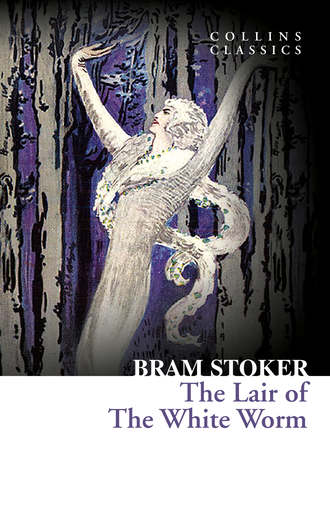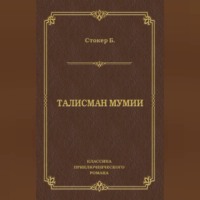
Полная версия
The Lair of the White Worm
“I rather gathered that you had some more definite—more personal reason for my hurrying. After all, history can keep—except in the making!”
“Quite right, my boy. I had a reason such as you very wisely guessed. I was anxious for you to be here when a rather important phase of our local history occurred.”
“What is that, if I may ask, sir?”
“Certainly. The principal landowner of our part of the county is on his way home, and there will be a great home-coming, which you may care to see. The fact is, for more than a century the various owners in the succession here, with the exception of a short time, have lived abroad.”
“How is that, sir, if I may ask?”
“The great house and estate in our part of the world is Castra Regis, the family seat of the Caswall family. The last owner who lived here was Edgar Caswall, grandfather of the man who is coming here—and he was the only one who stayed even a short time. This man’s grandfather, also named Edgar—they keep the tradition of the family Christian name—quarrelled with his family and went to live abroad, not keeping up any intercourse, good or bad, with his relatives, although this particular Edgar, as I told you, did visit his family estate, yet his son was born and lived and died abroad, while his grandson, the latest inheritor, was also born and lived abroad till he was over thirty—his present age. This was the second line of absentees. The great estate of Castra Regis has had no knowledge of its owner for five generations—covering more than a hundred and twenty years. It has been well administered, however, and no tenant or other connected with it has had anything of which to complain. All the same, there has been much natural anxiety to see the new owner, and we are all excited about the event of his coming. Even I am, though I own my own estate, which, though adjacent, is quite apart from Castra Regis.—Here we are now in new ground for you. That is the spire of Salisbury Cathedral, and when we leave that we shall be getting close to the old Roman county, and you will naturally want your eyes. So we shall shortly have to keep our minds on old Mercia. However, you need not be disappointed. My old friend, Sir Nathaniel de Salis, who, like myself, is a free-holder near Castra Regis—his estate, Doom Tower, is over the border of Derbyshire, on the Peak—is coming to stay with me for the festivities to welcome Edgar Caswall. He is just the sort of man you will like. He is devoted to history, and is President of the Mercian Archaeological Society. He knows more of our own part of the country, with its history and its people, than anyone else. I expect he will have arrived before us, and we three can have a long chat after dinner. He is also our local geologist and natural historian. So you and he will have many interests in common. Amongst other things he has a special knowledge of the Peak and its caverns, and knows all the old legends of prehistoric times.”
They spent the night at Cheltenham, and on the following morning resumed their journey to Stafford. Adam’s eyes were in constant employment, and it was not till Salton declared that they had now entered on the last stage of their journey, that he referred to Sir Nathaniel’s coming.
As the dusk was closing down, they drove on to Lesser Hill, Mr. Salton’s house. It was now too dark to see any details of their surroundings. Adam could just see that it was on the top of a hill, not quite so high as that which was covered by the Castle, on whose tower flew the flag, and which was all ablaze with moving lights, manifestly used in the preparations for the festivities on the morrow. So Adam deferred his curiosity till daylight. His grand-uncle was met at the door by a fine old man, who greeted him warmly.
“I came over early as you wished. I suppose this is your grand-nephew—I am glad to meet you, Mr. Adam Salton. I am Nathaniel de Salis, and your uncle is one of my oldest friends.”
Adam, from the moment of their eyes meeting, felt as if they were already friends. The meeting was a new note of welcome to those that had already sounded in his ears.
The cordiality with which Sir Nathaniel and Adam met, made the imparting of information easy. Sir Nathaniel was a clever man of the world, who had travelled much, and within a certain area studied deeply. He was a brilliant conversationalist, as was to be expected from a successful diplomatist, even under unstimulating conditions. But he had been touched and to a certain extent fired by the younger man’s evident admiration and willingness to learn from him. Accordingly the conversation, which began on the most friendly basis, soon warmed to an interest above proof, as the old man spoke of it next day to Richard Salton. He knew already that his old friend wanted his grand-nephew to learn all he could of the subject in hand, and so had during his journey from the Peak put his thoughts in sequence for narration and explanation. Accordingly, Adam had only to listen and he must learn much that he wanted to know. When dinner was over and the servants had withdrawn, leaving the three men at their wine, Sir Nathaniel began:
“I gather from your uncle—by the way, I suppose we had better speak of you as uncle and nephew, instead of going into exact relationship? In fact, your uncle is so old and dear a friend, that, with your permission, I shall drop formality with you altogether and speak of you and to you as Adam, as though you were his son.”
“I should like,” answered the young man, “nothing better!”
The answer warmed the hearts of both the old men, but, with the usual avoidance of Englishmen of emotional subjects personal to themselves, they instinctively returned to the previous question. Sir Nathaniel took the lead.
“I understand, Adam, that your uncle has posted you regarding the relationships of the Caswall family?”
“Partly, sir; but I understood that I was to hear minuter details from you—if you would be so good.”
“I shall be delighted to tell you anything so far as my knowledge goes. Well, the first Caswall in our immediate record is an Edgar, head of the family and owner of the estate, who came into his kingdom just about the time that George III. did. He had one son of about twenty-four. There was a violent quarrel between the two. No one of this generation has any idea of the cause; but, considering the family characteristics, we may take it for granted that though it was deep and violent, it was on the surface trivial.
“The result of the quarrel was that the son left the house without a reconciliation or without even telling his father where he was going. He never came back again. A few years after, he died, without having in the meantime exchanged a word or a letter with his father. He married abroad and left one son, who seems to have been brought up in ignorance of all belonging to him. The gulf between them appears to have been unbridgable; for in time this son married and in turn had a son, but neither joy nor sorrow brought the sundered together. Under such conditions no rapprochement was to be looked for, and an utter indifference, founded at best on ignorance, took the place of family affection—even on community of interests. It was only due to the watchfulness of the lawyers that the birth of this new heir was ever made known. He actually spent a few months in the ancestral home.
“After this the family interest merely rested on heirship of the estate. As no other children have been born to any of the newer generations in the intervening years, all hopes of heritage are now centred in the grandson of this man.
“Now, it will be well for you to bear in mind the prevailing characteristics of this race. These were well preserved and unchanging; one and all they are the same: cold, selfish, dominant, reckless of consequences in pursuit of their own will. It was not that they did not keep faith, though that was a matter which gave them little concern, but that they took care to think beforehand of what they should do in order to gain their own ends. If they should make a mistake, someone else should bear the burthen of it. This was so perpetually recurrent that it seemed to be a part of a fixed policy. It was no wonder that, whatever changes took place, they were always ensured in their own possessions. They were absolutely cold and hard by nature. Not one of them—so far as we have any knowledge—was ever known to be touched by the softer sentiments, to swerve from his purpose, or hold his hand in obedience to the dictates of his heart. The pictures and effigies of them all show their adherence to the early Roman type. Their eyes were full; their hair, of raven blackness, grew thick and close and curly. Their figures were massive and typical of strength.
“The thick black hair, growing low down on the neck, told of vast physical strength and endurance. But the most remarkable characteristic is the eyes. Black, piercing, almost unendurable, they seem to contain in themselves a remarkable will power which there is no gainsaying. It is a power that is partly racial and partly individual: a power impregnated with some mysterious quality, partly hypnotic, partly mesmeric, which seems to take away from eyes that meet them all power of resistance—nay, all power of wishing to resist. With eyes like those, set in that all-commanding face, one would need to be strong indeed to think of resisting the inflexible will that lay behind.
“You may think, Adam, that all this is imagination on my part, especially as I have never seen any of them. So it is, but imagination based on deep study. I have made use of all I know or can surmise logically regarding this strange race. With such strange compelling qualities, is it any wonder that there is abroad an idea that in the race there is some demoniac possession, which tends to a more definite belief that certain individuals have in the past sold themselves to the Devil?
“But I think we had better go to bed now. We have a lot to get through to-morrow, and I want you to have your brain clear, and all your susceptibilities fresh. Moreover, I want you to come with me for an early walk, during which we may notice, whilst the matter is fresh in our minds, the peculiar disposition of this place—not merely your grand-uncle’s estate, but the lie of the country around it. There are many things on which we may seek—and perhaps find—enlightenment. The more we know at the start, the more things which may come into our view will develop themselves.”
CHAPTER 3
Diana’s Grove
Curiosity took Adam Salton out of bed in the early morning, but when he had dressed and gone downstairs; he found that, early as he was, Sir Nathaniel was ahead of him. The old gentleman was quite prepared for a long walk, and they started at once.
Sir Nathaniel, without speaking, led the way to the east, down the hill. When they had descended and risen again, they found themselves on the eastern brink of a steep hill. It was of lesser height than that on which the Castle was situated; but it was so placed that it commanded the various hills that crowned the ridge. All along the ridge the rock cropped out, bare and bleak, but broken in rough natural castellation. The form of the ridge was a segment of a circle, with the higher points inland to the west. In the centre rose the Castle, on the highest point of all. Between the various rocky excrescences were groups of trees of various sizes and heights, amongst some of which were what, in the early morning light, looked like ruins. These—whatever they were—were of massive grey stone, probably limestone rudely cut—if indeed they were not shaped naturally. The fall of the ground was steep all along the ridge, so steep that here and there both trees and rocks and buildings seemed to overhang the plain far below, through which ran many streams.
Sir Nathaniel stopped and looked around, as though to lose nothing of the effect. The sun had climbed the eastern sky and was making all details clear. He pointed with a sweeping gesture, as though calling Adam’s attention to the extent of the view. Having done so, he covered the ground more slowly, as though inviting attention to detail. Adam was a willing and attentive pupil, and followed his motions exactly, missing—or trying to miss—nothing.
“I have brought you here, Adam, because it seems to me that this is the spot on which to begin our investigations. You have now in front of you almost the whole of the ancient kingdom of Mercia. In fact, we see the whole of it except that furthest part, which is covered by the Welsh Marches and those parts which are hidden from where we stand by the high ground of the immediate west. We can see—theoretically—the whole of the eastern bound of the kingdom, which ran south from the Humber to the Wash. I want you to bear in mind the trend of the ground, for some time, sooner or later, we shall do well to have it in our mind’s eye when we are considering the ancient traditions and superstitions, and are trying to find the rationale of them. Each legend, each superstition which we receive, will help in the understanding and possible elucidation of the others. And as all such have a local basis, we can come closer to the truth—or the probability—by knowing the local conditions as we go along. It will help us to bring to our aid such geological truth as we may have between us. For instance, the building materials used in various ages can afford their own lessons to understanding eyes. The very heights and shapes and materials of these hills—nay, even of the wide plain that lies between us and the sea—have in themselves the materials of enlightening books.”
“For instance, sir?” said Adam, venturing a question.
“Well, look at those hills which surround the main one where the site for the Castle was wisely chosen—on the highest ground. Take the others. There is something ostensible in each of them, and in all probability something unseen and unproved, but to be imagined, also.”
“For instance?” continued Adam.
“Let us take them seriatim. That to the east, where the trees are, lower down—that was once the location of a Roman temple, possibly founded on a pre-existing Druidical one. Its name implies the former, and the grove of ancient oaks suggests the latter.”
“Please explain.”
“The old name translated means ‘Diana’s Grove.’ Then the next one higher than it, but just beyond it, is called ‘Mercy’—in all probability a corruption or familiarisation of the word Mercia, with a Roman pun included. We learn from early manuscripts that the place was called Vilula Misericordiae. It was originally a nunnery, founded by Queen Bertha, but done away with by King Penda, the reactionary to Paganism after St. Augustine. Then comes your uncle’s place—Lesser Hill. Though it is so close to the Castle, it is not connected with it. It is a freehold, and, so far as we know, of equal age. It has always belonged to your family.”
“Then there only remains the Castle!”
“That is all; but its history contains the histories of all the others—in fact, the whole history of early England.” Sir Nathaniel, seeing the expectant look on Adam’s face, went on:
“The history of the Castle has no beginning so far as we know. The furthest records or surmises or inferences simply accept it as existing. Some of these—guesses, let us call them—seem to show that there was some sort of structure there when the Romans came, therefore it must have been a place of importance in Druid times—if indeed that was the beginning. Naturally the Romans accepted it, as they did everything of the kind that was, or might be, useful. The change is shown or inferred in the name Castra. It was the highest protected ground, and so naturally became the most important of their camps. A study of the map will show you that it must have been a most important centre. It both protected the advances already made to the north, and helped to dominate the sea coast. It sheltered the western marches, beyond which lay savage Wales—and danger. It provided a means of getting to the Severn, round which lay the great Roman roads then coming into existence, and made possible the great waterway to the heart of England—through the Severn and its tributaries. It brought the east and the west together by the swiftest and easiest ways known to those times. And, finally, it provided means of descent on London and all the expanse of country watered by the Thames.
“With such a centre, already known and organised, we can easily see that each fresh wave of invasion—the Angles, the Saxons, the Danes, and the Normans—found it a desirable possession and so ensured its upholding. In the earlier centuries it was merely a vantage ground. But when the victorious Romans brought with them the heavy solid fortifications impregnable to the weapons of the time, its commanding position alone ensured its adequate building and equipment. Then it was that the fortified camp of the Caesars developed into the castle of the king. As we are as yet ignorant of the names of the first kings of Mercia, no historian has been able to guess which of them made it his ultimate defence; and I suppose we shall never know now. In process of time, as the arts of war developed, it increased in size and strength, and although recorded details are lacking, the history is written not merely in the stone of its building, but is inferred in the changes of structure. Then the sweeping changes which followed the Norman Conquest wiped out all lesser records than its own. To-day we must accept it as one of the earliest castles of the Conquest, probably not later than the time of Henry I. Roman and Norman were both wise in their retention of places of approved strength or utility. So it was that these surrounding heights, already established and to a certain extent proved, were retained. Indeed, such characteristics as already pertained to them were preserved, and to-day afford to us lessons regarding things which have themselves long since passed away.
“So much for the fortified heights; but the hollows too have their own story. But how the time passes! We must hurry home, or your uncle will wonder what has become of us.”
He started with long steps towards Lesser Hill, and Adam was soon furtively running in order to keep up with him.
CHAPTER 4
The Lady Arabella March
“Now, there is no hurry, but so soon as you are both ready we shall start,” Mr. Salton said when breakfast had begun. “I want to take you first to see a remarkable relic of Mercia, and then we’ll go to Liverpool through what is called ‘The Great Vale of Cheshire.’ You may be disappointed, but take care not to prepare your mind”—this to Adam—“for anything stupendous or heroic. You would not think the place a vale at all, unless you were told so beforehand, and had confidence in the veracity of the teller. We should get to the Landing Stage in time to meet the West African, and catch Mr. Caswall as he comes ashore. We want to do him honour—and, besides, it will be more pleasant to have the introductions over before we go to his fête at the Castle.”
The carriage was ready, the same as had been used the previous day, but there were different horses—magnificent animals, and keen for work. Breakfast was soon over, and they shortly took their places. The postillions had their orders, and were quickly on their way at an exhilarating pace.
Presently, in obedience to Mr. Salton’s signal, the carriage drew up opposite a great heap of stones by the wayside.
“Here, Adam,” he said, “is something that you of all men should not pass by unnoticed. That heap of stones brings us at once to the dawn of the Anglian kingdom. It was begun more than a thousand years ago—in the latter part of the seventh century—in memory of a murder. Wulfere, King of Mercia, nephew of Penda, here murdered his two sons for embracing Christianity. As was the custom of the time, each passer-by added a stone to the memorial heap. Penda represented heathen reaction after St. Augustine’s mission. Sir Nathaniel can tell you as much as you want about this, and put you, if you wish, on the track of such accurate knowledge as there is.”
Whilst they were looking at the heap of stones, they noticed that another carriage had drawn up beside them, and the passenger—there was only one—was regarding them curiously. The carriage was an old heavy travelling one, with arms blazoned on it gorgeously. The men took off their hats, as the occupant, a lady, addressed them.
“How do you do, Sir Nathaniel? How do you do, Mr. Salton? I hope you have not met with any accident. Look at me!”
As she spoke she pointed to where one of the heavy springs was broken across, the broken metal showing bright. Adam spoke up at once:
“Oh, that can soon be put right.”
“Soon? There is no one near who can mend a break like that.”
“I can.”
“You!” She looked incredulously at the dapper young gentleman who spoke. “You—why, it’s a workman’s job.”
“All right, I am a workman—though that is not the only sort of work I do. I am an Australian, and, as we have to move about fast, we are all trained to farriery and such mechanics as come into travel—I am quite at your service.”
“I hardly know how to thank you for your kindness, of which I gladly avail myself. I don’t know what else I can do, as I wish to meet Mr. Caswall of Castra Regis, who arrives home from Africa to-day. It is a notable home-coming; all the countryside want to do him honour.” She looked at the old men and quickly made up her mind as to the identity of the stranger. “You must be Mr. Adam Salton of Lesser Hill. I am Lady Arabella March of Diana’s Grove.” As she spoke she turned slightly to Mr. Salton, who took the hint and made a formal introduction.
So soon as this was done, Adam took some tools from his uncle’s carriage, and at once began work on the broken spring. He was an expert workman, and the breach was soon made good. Adam was gathering the tools which he had been using—which, after the manner of all workmen, had been scattered about—when he noticed that several black snakes had crawled out from the heap of stones and were gathering round him. This naturally occupied his mind, and he was not thinking of anything else when he noticed Lady Arabella, who had opened the door of the carriage, slip from it with a quick gliding motion. She was already among the snakes when he called out to warn her. But there seemed to be no need of warning. The snakes had turned and were wriggling back to the mound as quickly as they could. He laughed to himself behind his teeth as he whispered, “No need to fear there. They seem much more afraid of her than she of them.” All the same he began to beat on the ground with a stick which was lying close to him, with the instinct of one used to such vermin. In an instant he was alone beside the mound with Lady Arabella, who appeared quite unconcerned at the incident. Then he took a long look at her, and her dress alone was sufficient to attract attention. She was clad in some kind of soft white stuff, which clung close to her form, showing to the full every movement of her sinuous figure. She wore a close-fitting cap of some fine fur of dazzling white. Coiled round her white throat was a large necklace of emeralds, whose profusion of colour dazzled when the sun shone on them. Her voice was peculiar, very low and sweet, and so soft that the dominant note was of sibilation. Her hands, too, were peculiar—long, flexible, white, with a strange movement as of waving gently to and fro.
She appeared quite at ease, and, after thanking Adam, said that if any of his uncle’s party were going to Liverpool she would be most happy to join forces.
“Whilst you are staying here, Mr. Salton, you must look on the grounds of Diana’s Grove as your own, so that you may come and go just as you do in Lesser Hill. There are some fine views, and not a few natural curiosities which are sure to interest you, if you are a student of natural history—specially of an earlier kind, when the world was younger.”
The heartiness with which she spoke, and the warmth of her words—not of her manner, which was cold and distant—made him suspicious. In the meantime both his uncle and Sir Nathaniel had thanked her for the invitation—of which, however, they said they were unable to avail themselves. Adam had a suspicion that, though she answered regretfully, she was in reality relieved. When he had got into the carriage with the two old men, and they had driven off, he was not surprised when Sir Nathaniel spoke.











